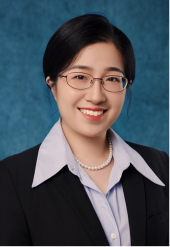
Dr. Tengteng Wang is an Assistant Professor of Medicine in the Division of Medical Oncology and Section of Cancer Epidemiology and Health Outcomes at Rutgers Robert Wood Johnson Medical School. She is a resident member of the Rutgers Cancer Institute of New Jersey. Before joining Rutgers, she was an Instructor in Medicine at the Harvard Medical School and Brigham and Women’s Hospital starting in 2022.
Dr. Wang’s research program centers on identifying modifiable factors such as diet, lifestyle, reproductive, and medication use that influence the etiology and progression of female cancers. She also focused on disentangling the underlying biological mechanisms by incorporating molecular biomarkers and multi-omics data. As the principal investigator of an NCI early K99/R00 grant, she is leading the first prospective study to examine the association between reproductive factors, gut microbiome, and benign breast disease in Nurses’ Health Study (NHS) II. This involves utilizing innovative shotgun metagenomics and metabolomics profiling data.
Dr. Wang has also taken the lead in several large epidemiological projects within NHS, examining type 2 diabetes-related dietary patterns and medication use. These projects incorporate novel tumor tissue biomarkers to investigate both breast cancer risk and survival. Her influential work on the diabetes risk reduction diet (DRRD) and survival post-breast cancer diagnosis revealed a remarkable ~20% reduction in breast cancer-specific mortality and a 34% reduction in overall mortality with stronger adherence to DRRD. These findings have been integrated into breast oncology clinical practices. Other ongoing research projects include examining plasma metabolomic signatures and breast cancer incidence, as well as exploring the impact of ultra-processed food intake on breast tumor gene expression, blood biomarkers, and survival outcomes in both White and Black populations by leveraging NHS and Women’s Circle of Health Follow-Up Study.
Dr. Wang’s long-term research goal is to continue integrating high-dimensional, molecular, and pathologic data, particularly microbiome data, in cancer epidemiologic studies. As a cancer epidemiologist with medical training, Dr. Wang is dedicated to making meaningful contributions to reducing the female cancer burden and fostering the growth of next-generation cancer epidemiology young scholars locally, nationally, and globally.
Research Interests
- Breast cancer and benign breast disease epidemiology
- Molecular pathological epidemiology
- Nutrition, lifestyle, medication use, and reproductive factors
- Cancer health disparities
- Human microbiome
- Metabolomics
- Multi-omics
Education and Training
- Postdoctoral Fellowship in Cancer Epidemiology, Harvard T.H. Chan School of Public Health, Harvard Medical School, and Brigham and Women’s Hospital
- Ph.D. in Epidemiology, The University of North Carolina at Chapel Hill, Gillings School of Public Health
Grants/Awards
- NIH Early K99/R00 Pathway to Independence Award (K99/R00 CA267557)
- National Research Service Award Institutional Training Grant T32 Postdoc Trainee
- UNC-Chapel Hill Lineberger Cancer Outcomes Research Travel Award
- UNC-Chapel Hill Department of Epidemiology Travel Scholarship
- Emory University Rollins Learn and Earn Award
- Chair’s Research Award, Harvard Medical School/Brigham and Women’s Hospital (2022)

